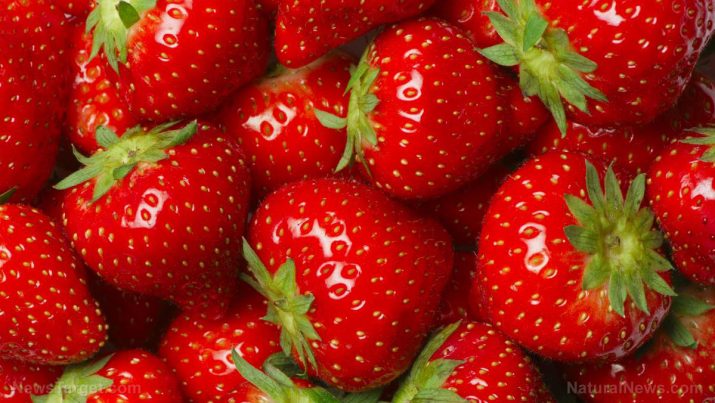
Strawberries – sources, health benefits, nutrients, uses and constituents at NaturalPedia.com
Wednesday, June 21, 2017 by Bridgette Wilcox
http://www.naturalpedia.com/strawberries-sources-health-benefits-nutrients-uses-and-constituents-at-naturalpedia-com.html

Strawberries are some of the most popular berries in the world, well-loved for their distinct sweet scent and flavor, as well as for their signature heart shape and bright red color. There are over 10 species of strawberries available, varying in texture, size, and flavor, BBCGoodFood.com reported. The garden strawberry is one of the most popular varieties, a hybrid of strawberries from France and those brought over from Chile and Peru.
When selecting strawberries, the plump ones are best. Ideally, they must be firm, free of blemishes and mold, and have a deep red color with bright green caps. It is important to wash them thoroughly before using or eating them.

List of known nutrients
- Antioxidants
- Ascorbic acid
- Biotin
- Chlorogenic acid
- Ellagic acid
- Flavonoids
- Folic acid
- Iodine
- Iron
- Manganese
- Pantothenic acid
- Phosphorus
- Polyphenols
- Potassium
- Silica
- Silicon
- Sulfur
- Vitamin A
- Vitamin B1
- Vitamin B3
- Vitamin B5
- Vitamin B6
- Vitamin C
- Vitamin K
Medicinal uses for strawberries
Strawberries are not only tasty, but healthy. Filled with a generous variety of vitamins and minerals, this unassuming fruit actually has a lot of medical and therapeutic applications.
Consuming strawberries regularly leads to a significantly reduced heart attack risk, owing to the berries’ flavonoid contents, MedicalNewsToday.com said. In particular, the flavonoid quercetin, which is heavily present in strawberries, has anti-inflammatory properties that protect against bad LDL cholesterol, thereby lowering the risk for atherosclerosis.
Querecetin’s anti-inflammatory properties may also be useful not only for boosting heart health but also for alleviating allergy symptoms such as runny nose, watery eyes, and hives.
Strawberries are also a rich source of polyphenol, which prevents platelet build-up and reduces blood pressure. The high fiber and potassium content of strawberries is also associated with improved heart health. Even more, the berries are linked to decreased levels of homocysteine, an amino acid that damages arterial lining. High homocysteine levels also inhibit the production of serotonin, dopamine, and norepinephrine, which are responsible for stabilizing the mood. In this way, strawberries can help prevent depression.
At the same time, the berries protect the body against stroke. It contains an antioxidant cocktail of quercetin, kaempferol, and anthocyanins, which prevents blood clot formation leading to stroke.
These antioxidants make strawberries an ideal cancer prevention food, as they fight against free radical damage and inhibit the growth of tumors.
Strawberries are great for the digestive system as well, with a high water and fiber content that maintains regular bowel movements and prevents constipation.
The amount of fiber in strawberries makes it well-suited for managing diabetes, as this keeps blood sugar at healthy, stable levels. They also have a lower glycemic index than most fruits, making it safe for diabetics. In addition, a study has found that fisetin, a flavonoid found in strawberries, is associated with lower risk of kidney and brain complications in diabetic mice.
Strawberries contain a good amount of folate, allowing them to boost natal health and protect infants from birth defects while they are in the womb.
Strawberries may also be efficient against:
- Appetite loss
- Bronchitis
- Cystitis
- Edema
- Fever
- Gout
- Inflammation
- Motion sickness
- Poor appetite
- Rheumatoid arthritis
- Vertigo
Body systems supported by strawberries
Here are the body systems that benefit from strawberries, according to OrganicFacts.net:
- Brain
- Cardiovascular system
- Eyes
- Immune system
- Muscles and joints
Ways to use strawberries
The tart sweetness of strawberries make them ideal for desserts, though when included in savory dishes, they add an unexpected and pleasant twist. Recipes on Delish.com show how strawberries can be used in cheesecakes, pies, cobblers, and the famous strawberry shortcake. They make a great topper for cereal, oats, or yogurt, and can be blended into smoothies and shakes along with other fruits. They can also be added to salads and soups, or used to make sauce for meat dishes. Eaten on their own, strawberries make a great snack or dessert.
Where to learn more
- Strawberries again vindicated in the fight against heart disease, diabetes and cognitive decline
- Strawberries can help cure gastritis
- Strawberries: The Superfruit that Lowers Bad Cholesterol and Promotes Good Health
- Strawberries proven to block mercury in fish: Health Ranger shares research with the public
- Strawberries Stimulate Metabolism and Suppress Appetite
Summary
Strawberries can prevent heart attacks and lower bad LDL cholesterol.
They may be able to alleviate allergy symptoms due to anti-inflammatory properties.
They keep blood pressure pressure stable.
Strawberries can help improve depression.
They can prevent stroke.
Strawberries are good for cancer prevention.
They benefit the digestion and can reduce constipation.
Strawberries are ideal for managing diabetes by regulating blood sugar levels.
They help protect infants from birth defects while in the womb.
Sources include:
Tagged Under: Tags: Strawberries





